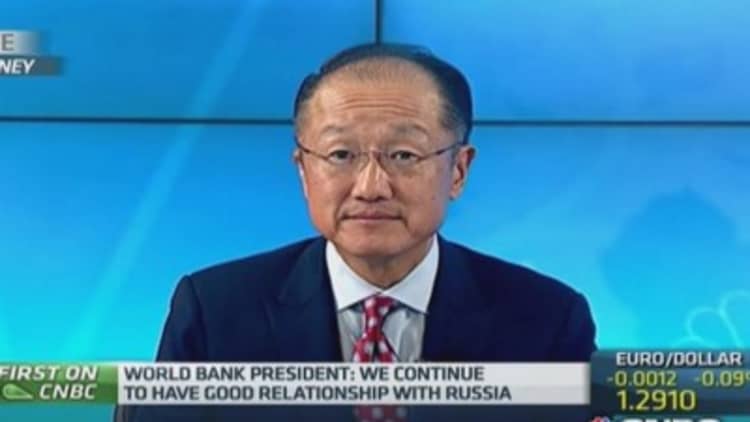Vladimir Putin has demanded a reopening of the EU's recently-ratified trade pact with Ukraine and has threatened "immediate and appropriate retaliatory measures" if Kiev moves to implement any parts of the deal.
The demand, made in a letter to European Commission President José Manuel Barroso, reflects Russia's determination to put a brake on Ukraine's integration into Europe and other Euro-Atlantic organisations such as Nato, even after annexing Crimea and creating a pro-Russian separatist entity in the east of the country.
It also comes amid a fresh crackdown on Russia's oligarchs, exemplified by the recent house arrest of billionaire businessman Vladimir Yevtushenkov, which was extended by a court on Thursday.
Read MorePutin plays chickenwith US farmers-and loses
The integration treaty was the spark that set off the 10-month Ukraine crisis after the country's then-president, Viktor Yanukovich, backed out of the deal. Petro Poroshenko, the new Ukrainian president, has made integration with the EU a key objective of his presidency.
But this is strongly opposed by Moscow, which is determined to keep Ukraine within its own economic sphere of influence.
Mr Putin's letter argues that a 15-month delay in implementing part of the deal – which Kiev and the EU agreed to earlier this month – should be used to "establish negotiating teams" to make wholesale changes to the deal.

Ukraine and the EU agreed to the delay under Russian pressure but view it only as a means of reassuring the Kremlin that it will not harm Russian economic ties to Ukraine.
"We still believe that only systemic adjustments of the association agreement, which take into account the full range of risks to Russian-Ukrainian economic ties and to the whole Russian economy arising from implementation of the agreement, will allow [us] to retain existing trade and economic considerations between the Russian Federation and Ukraine," Mr Putin says in his letter.
EU officials have remained adamant the treaty cannot be changed despite Kremlin demands that as many as 2,400 tariff lines be modified in the pact.
Read MorePutin wants to control Russian web access: Reports
"We are creating a kind of 'time out'; you could call this a 'peace clause'," Karel De Gucht, the EU's trade chief who negotiated directly with Mr Putin last month in Minsk, said in an interview. "The Russians, of course, they do not see this as a period of clarification but as a time they can put on the table a personne interposée [third party] – in fact emptying the agreement."
Mr Putin's letter appeared part of a growing realisation in Moscow that the 15-month hiatus had not won the Kremlin any concrete concessions since it allowed the treaty's ratification to proceed. According to one person briefed on internal Kremlin deliberations, the hiatus led to a bust-up within the Russian government shortly after it was agreed.
"There was a complete breakdown in communication within the administration, and those participating in the talks including economy minister [Alexei] Ulyukaev got scolded really badly," said the person.
Read MoreWorld Bank warnson Russia as sanctions bite
In the letter, sent the day after the Ukrainian and European parliaments simultaneously ratified the pact, Mr Putin warns any move towards changing Ukrainian laws to better align them with EU regulations would be considered "an infringement" of the hiatus warranting retaliation.
"It's like a scud that's prepared. It's not yet launched, but it's ready to be launched," said Mr De Gucht. He insisted the agreement had no provisions preventing Kiev from adjusting its domestic standards during the hiatus.
Mr Poroshenko on Thursday set out an ambitious plan designed to get Ukraine ready to apply for EU membership by 2020, an indication he is unwilling to delay legislative reforms despite the Russian threat. The plan included measures to fight corruption, decentralise power, reduce Ukraine's reliance on Russian energy and reform the justice systems.
More from the Financial Times:
Shellshockshows internet 'built on thin ice'
FBI claims to have identified Jihadi John
EYrevenues rise on back of advisory work
The new stand-off over the treaty comes ahead of a meeting on Tuesday of EU diplomats tasked with weighing whether to suspend sanctions imposed on Russia. A senior Nato diplomat said conventional Russian troops had mostly withdrawn from Ukraine and a recent exchange of prisoners was a sign Mr Putin, for the first time, may be serious about de-escalation.
But EU diplomats said it remains highly unlikely Brussels would back off any measures next week, saying the largest European countries – particularly Germany – believe the Kremlin has not done nearly enough to warrant such a move.
Although the European Commission has been tasked with drawing up options to suspend the sanctions, Mr De Gucht said it was unlikely to recommend such actions. "At this moment in time, there is no reason whatsoever to change anything to the sanctions," he said. "What you really should have is a peace plan respecting the territorial integrity of Ukraine. That's not yet in place."

